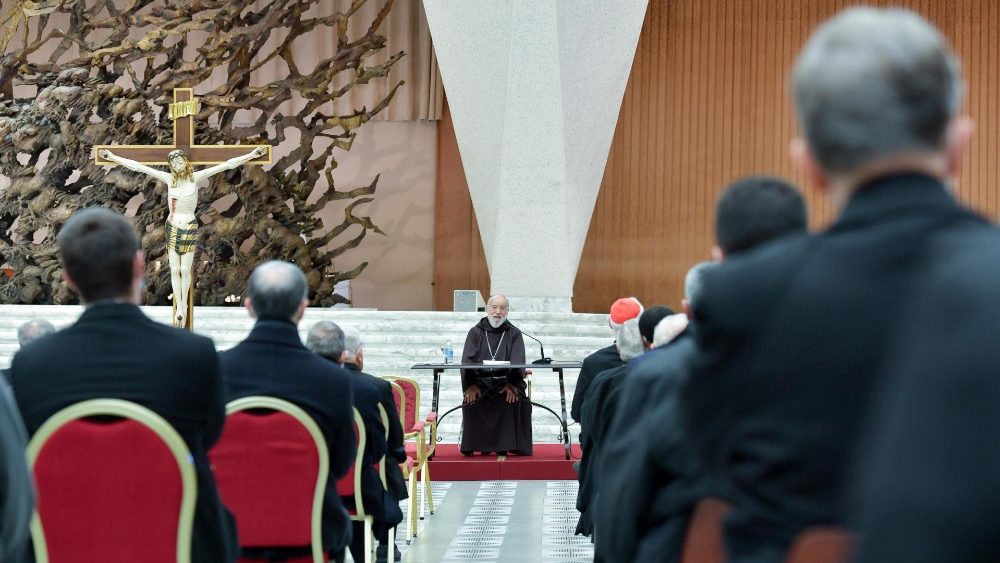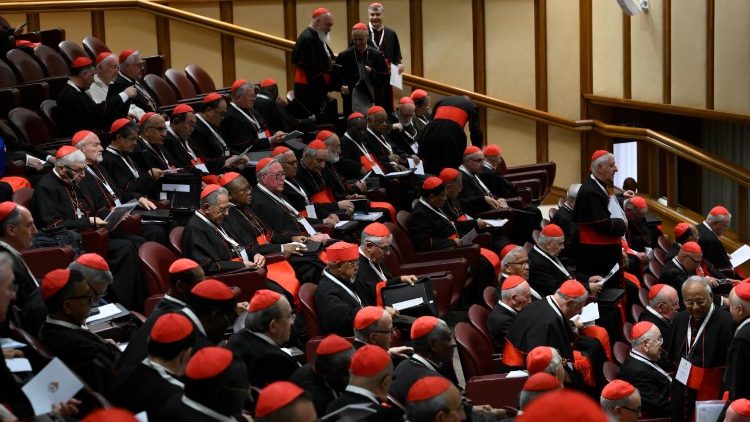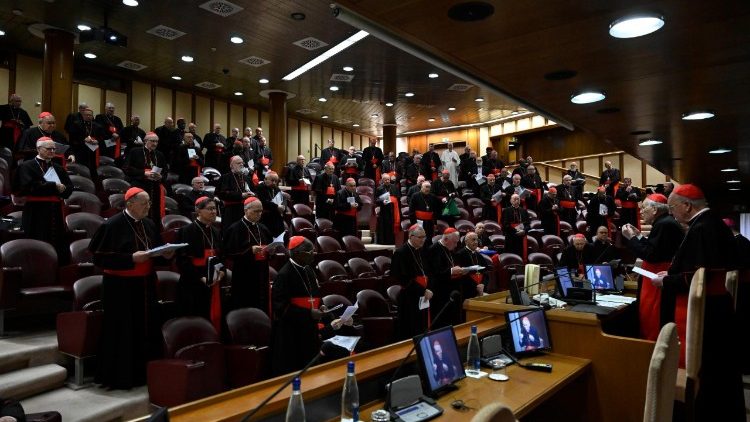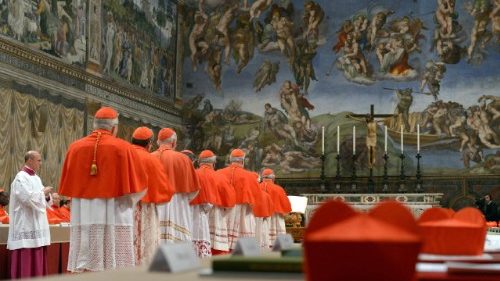Cardinal Cantalamessa: Fidelity of the Spirit to chart the course of the Church
Last meditation of Lent in the Paul VI Hall of Vatican City, in the presence of Pope Francis and the Roman Curia

On a ship it is not necessary for “all passengers to have their ears glued to the ship’s radio, to receive signals about the course, possible icebergs and weather conditions”; but it is “indispensable for those responsible on board.”
Starting from this eloquent image, Cardinal Raniero Cantalamessa – during the fifth and final Lenten preaching that took place this morning in the Paul VI Hall of Vatican City in the presence of Pope Francis – recalled the need to maintain “an attentive ear” to the “suggestions” of the Holy Spirit: a duty “important for every Christian”, but “vital for those who have government tasks in the Church”. Only in this way is “the same Spirit of Christ allowed to guide his Church through its human representatives.”
In the itinerary chosen for the theme of meditations on the discovery of who Jesus is through the Gospel of John, the cardinal dedicated this last stage to reflecting on what is usually called the “farewell speeches” of the apostles. In particular, he recalled chapter 14 of the Gospel of John (3-6), which contains the words that “only one person in the world could and did speak,” namely: “I am the way, the truth, and the life.”
Indeed, “Christ is the way, and he is the final destination of the way” Specifically, as “the Eternal Word of the Father, He is the truth and the life; as the Word made flesh, He is the way.”
Pausing on this last image – after having dedicated his previous preachings to a reflection on Christ “life” and “truth” – Cardinal Cantalamessa observed that “Jesus continues to say to those he meets” what he said to the apostles and those he met during his earthly life:
“Come after me,” or in the singular “Follow me!” The following of Christ – he explained – “is a subject without limits.” And about him, he wrote “the most loved and read book of the Church, after the Bible, namely, ‘The Imitation of Christ’.”
After all, following Jesus is almost “synonymous with believing in Him.” Believing, in effect, “is an attitude of the mind and will.” But the image of the “path” highlights an important aspect of believing, which is the “walk”, that is, the dynamism that should characterize the life of the Christian and the impact that faith should have on the conduct of life.
Cardinal Cantalamessa delved into what characterizes the following of Christ and distinguishes it from any other type of following, noting first of all that an artist, a philosopher, a man of letters, it is said that “he was trained in the school of such or what renowned teacher.”
But between this following and that of Christ, he said, “there is an essential difference.” For all Christians, that word means something “more radical”: the Gospel “was given to us by the earthly Jesus, but the ability to observe it and put it into practice only comes to us from the risen Christ, through his Spirit.” .
If Jesus is “the way,” the cardinal observed, “the Holy Spirit is the guide.” And among the various functions that Jesus attributes to the Paraclete “in his work on our behalf,” the cardinal focused in particular on that of “prompter.”
The reference is to the “inspirations of the Spirit” – the so-called “good inspirations” – following which is found “the shortest and surest path to holiness.” In fact, the preacher stressed, “we do not know at the beginning what holiness God wants from each of us; only God knows it and reveals it to us as the path progresses.”
Therefore, “man cannot limit himself to following the general rules that apply to everyone; he must also understand what God asks of him, and only of him.” And this, the cardinal assured, “is discovered through the events of life, the word of Scripture, the guidance of the spiritual director.”
But the principal and ordinary means remain “the inspirations of grace.” These are – he explained – “internal impulses of the Spirit in the depths of the heart, through which God not only makes known what he desires of us, but also gives the necessary strength, and often even the joy, to achieve it. , if the person consents.”
When it comes to “important decisions for oneself or for others, inspiration must be submitted and confirmed by authority, or by the spiritual father.” Indeed, noted Cardinal Cantalamessa, “one exposes himself to danger if he trusts solely in his own personal inspiration.”
The cardinal also referred to the current experience of the Pentecostal and charismatic movements, in the light of which this charisma seems to consist of the ability of the assembly, or of some in it, to react actively to a prophetic word, to a biblical quote or a prayer.
In this way, true and false prophecy come to be judged “by the fruits” they produce, or do not produce, as Jesus recommended. This original sense of the discernment of spirits, the preacher noted, “could be very relevant even today in debates and meetings, such as those we are beginning to experience in the synodal dialogue.”
In the moral sphere, Cardinal Cantalamessa pointed out “a fundamental criterion” of discernment that “is given by the coherence of the Spirit of God with itself.”
To conclude, emphasizing the “vital” task of welcoming the inspirations of the Spirit for those who have a “governing role in the Church,” the preacher referred to Pope Roncalli and the Second Vatican Council.
“It was precisely from a divine inspiration, courageously welcomed by Pope Saint John XXIII,” that the great concilia event emerged, he said. And in the same way, “after him other prophetic gestures were born, which – the preacher added – those who will come after us will realize.”
Related

On the Road to the Conclave: The Church Prepares to Elect the New Pope on May 7
Alberto Ramírez
29 April, 2025
2 min

What are the Congregations before the Conclave?
Exaudi Staff
29 April, 2025
3 min

The Conclave will begin on May 7
Exaudi Staff
28 April, 2025
1 min

Cardinal Parolin at the Novendalia Mass: “Mercy leads us to the heart of faith”
Exaudi Staff
27 April, 2025
8 min
 (EN)
(EN)
 (ES)
(ES)
 (IT)
(IT)

